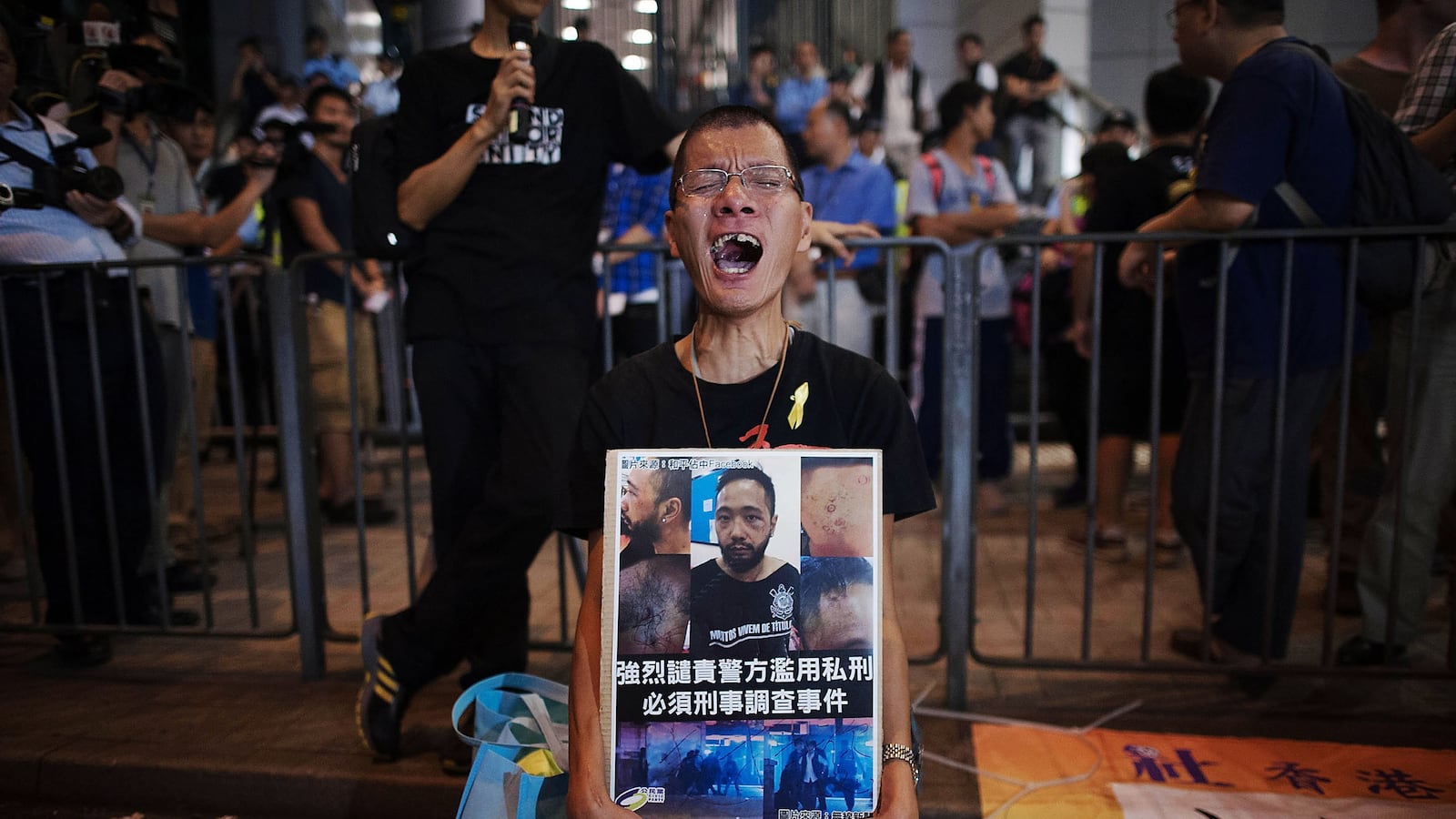HONG KONG—The reputation of the Hong Kong police force has taken a pounding over the past two and a half weeks. First came the pepper spray and the tear gas. Then followed allegations of collusion with the triads, and accusations that law enforcement turned a blind eye when mobs moved in on defenseless protesters. Yet the police seemed to be weathering the political storm with the help of sympathetic media coverage, savvy PR, and the local government’s full support.
But police brutality caught on camera and broadcast to the nation on breakfast TV had changed the picture entirely, and those four minutes of video could well come to define the future of these pro-democracy protests. The least that can be said is that they’re a public-relations disaster for those in power.
Anyone who’s seen the footage in Hong Kong would have been shocked by it: Seven plainclothes policemen carried a hand-cuffed protester into a secluded spot just yards from the scene of the latest scuffles, then beat him and kicked him senseless while one of their members remained on the lookout. Unfortunately for his crew, their man was looking at every direction but the TV camera’s.
So far, the reaction to the beating has been entirely predictable: pro-democracy and anti-government protesters even more outraged than before; opposition lawmakers demanding appropriate punishment for the accused officers; the police ceding to the Independent Police Complaints Commission to conduct the enquiry but shielding the culpable officers by “reassigning” them elsewhere (for now); and high officials appointed by Beijing (plus those with future political ambitions) all urging the public to exercise restraint before jumping to conclusions.
But the damage has already been done. Later news reports maintained that the beating of this protester didn’t stop on site but continued as he was bundled from one police station to another before finally being taken to a hospital hours later. Even critics of the protests are asking serious questions about the police action.
The ever-strident pro-police, pro-government Blue Ribbon Movement (their choice of color reflects the local police uniform and is meant to counter the yellow ribbon adopted by the pro-democracy protesters) expressed regret at a press conference and demanded a full explanation from their patrons.
Even the channel that broadcast the original footage is an unlikely source for such negative publicity. TVB—which has long been accused by protesters of being “dumb” and too pro-government for fear of losing its broadcast license—saw two of its cameramen pepper-sprayed and injured during the overnight melee.
For the neutrals, this episode could well be the tipping point. Yes, the protests themselves had lost momentum over the past 10 days or so. Yes, people are generally fed up or simply bored of the protests and the disruptions caused. But after such a brutal beating—which we know happens all the time behind closed doors at police stations or in panda cars but just never in public—it’s become harder for many to just sit on the fence. Indeed, more people are back out on the streets Wednesday night outside the main police HQ in the Admiralty District, and angrier than ever.
The victim, a volunteer social worker named Ken Tsang Kin-chiu, just also happens to be an activist with the liberal Civic Party, which forms part of the anti-Beijing bloc in the local legislature. He now finds himself at the epic center of a firestorm having earlier been caught on camera throwing “liquids” at the police.
Late Wednesday, Tsang even paraded his injuries before the cameras with the media clinging to his—and his lawyer’s—every word (in both English and Cantonese). Pictures of his bruises and cuts are also being shared extensively on social media and smartphones.
So, once widely respected and renowned for its neutrality and civic duty, the police have certainly seen their reputation take a hit. In fact, trust in the force has steadily fallen over the past five years, with many accusing the Beijing-appointed Hong Kong government of politicizing the force by encouraging officers to take a firmer line during various anti-government demonstrations.
Likewise, many policemen are said to be shirking their most basic duties while devoting more manpower to penalizing jaywalkers and motorists in order to meet targets and gain promotions.
Earlier in this wave of civil disobedience, overall public trust in the police—even after the use of pepper spray and tear gas on day two of these protests—hovered at a respectable 35 percent. The government and certain sections of the media worked hard to persuade people that the protesters were troublemakers, and the cops were merely trying to maintain order.
In addition, the protests had been largely contained to very specific areas and the fear of contagion never materialized. Nor has social disorder broken down in other parts of the city. With round-the-clock police reinforcements at the most high-risk sites, there are inevitable shortages in manpower elsewhere, for example along the Chinese border or the more remote parts of the territory. Yet, there’s been no looting or a spike in murder rates over the past 18 days. Therefore, the general perception has been that the police have done a pretty decent job—especially in reopening some of the major thoroughfares which, until this week, had been blocked for days.
And then there’s the question of what constitutes excessive force. No doubt there are still questions to be asked of the leadership as to why pepper spray and tear gas were used just two days into the protests during a nonviolent confrontation, an incident that helped drive even more people onto the streets the next day in support of the protesters.
Similarly, dozens of pro-democracy activists have told The Daily Beast of negligence by the police when it comes to dealing with paid mobs and triads who infiltrated the occupiers and caused troubles there—many cussing and hurling abuse at the men in blue for whom they have nothing but contempt.
But many more—the so-called silent majority who never protested—saw things differently. Hongkongers don’t generally like chaos: It affects the economy, investor confidence, house prices, their kids’ education, their commute to work, and so on. Their argument—and it is one that can be overheard in restaurants or on buses away from the main protest sites—is that it is the job of the police to prevent anarchy.
And how is a police force supposed to maintain social order without crossing the line? When we spoke to a couple of retired police officers recently, both agreed that had the orders from above been to use tear gas, neither would have hesitated today. It’s part of their ethos and “you do as you’re told,” they reasoned. If protesters are blocking highways and public access, the police have the right to remove them by force if necessary.
Indeed, many argue that the police have been too soft on the protesters to date, citing Ferguson, Missouri, or Greece as evidence that Western police forces are far more brutal and ready to use violence in dispersing crowds than their counterparts in Hong Kong.
Another retired officer even told The Daily Beast that citizens and criminals now have far more channels to complain about police assaultS than under British colonial times, due to the advance of civil-rights groups and social-affairs organizations.
In point of fact, there’s been a leadership deficit across the board—in the government, in the police, among protest leaders—that has made resolving this crisis more difficult.
And, ironically, while it heightens anger, this latest incident just distracts from the real issue that got thousands onto the streets in the first place: the political impasse over Beijing reneging on its promise to allow Hongkongers to vote for their next local leader by universal suffrage in 2017.
As the protests continue, Beijing is becoming impatient, but reassures Hongkongers that the People’s Liberation Army will only be used if there is chaos. That is no consolation. It clearly is a warning. When or if that day comes, the beating of Ken Tsang and police brutality will be a mere footnote, replaced by something far more violent, sinister, and unimaginable than what seven plainclothes policemen did in the middle of the night.






